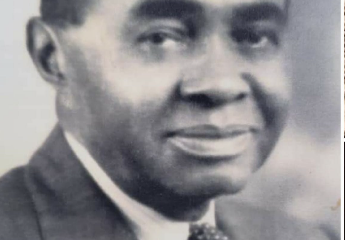Spirituality
Do I Really Love God?
By Dr. Robert Charles Scott.
 One of the most expressive, meaningful ways that anyone can determine if they have a relationship with God is based upon how they relate with others, be it friend, family, or foe. However, before dealing with the context and confines of human relationships, the Bible in Matthew 22:37-40 provides a spiritual imperative that one should love the Lord your God with all your heart, with all your soul and all your mind and this is considered to be the first commandment. Then, Jesus goes on to further declare that you should love your neighbor as yourself. On these two commandments hang all the Law and the Prophets.
One of the most expressive, meaningful ways that anyone can determine if they have a relationship with God is based upon how they relate with others, be it friend, family, or foe. However, before dealing with the context and confines of human relationships, the Bible in Matthew 22:37-40 provides a spiritual imperative that one should love the Lord your God with all your heart, with all your soul and all your mind and this is considered to be the first commandment. Then, Jesus goes on to further declare that you should love your neighbor as yourself. On these two commandments hang all the Law and the Prophets.
Do I Love Myself?
I wrestle with the idea of loving God and my neighbor because the common and congruent nexus is me. However, it is hard to really love God and my neighbor if I don’t love myself. Nevertheless, it is hard to love self if I am unaware of how loved I am by God. Yet, if I am to love God, then I must be willing to be obedient and submit to God in my relationship with others.
Too many of us fail to understand that implicit in my love of God, I will have to be submissive to God. And when I am submissive to God, then it means that I must be willing to confront those other relationships that have the tendency to subject God in second place.
Conflict and Confrontation
My love of God has to be seen in my willingness to confront persons and/or institutions that want my allegiance and loyalty. The failure of biblical confrontation (or non confrontation) is because we want to have god replacements. We confront unbilblically because we love someone or something more than God. Perhaps we love the job, the spouse, the children, the material possessions, or the lover so much that we don’t want to risk losing it. Perhaps we want to avoid the personal sacrifice and heartache that conflict engenders. Maybe we love the idea of peace, acceptance, and even admiration to the point that we are afraid to speak truth in love. Speaking truth in love demonstrates that we are putting God before anyone or anything else. Therefore, confrontation is an expression and extension of that love.
Loving Your Neighbor
One of the most reliable indicators of our love for God is the quality and sincerity of our love for our neighbor. Matthew helps us to understand that you cannot love your neighbor as yourself if you don’t first love God above anyone and anything else. When we gossip, lie, live in anger, exhibit envy, or don’t tell the truth, it shows something deeper than a lack of love and respect for people. It exposes a lack of love for God. When there is a lack of love for God, then we cannot be God’s agents of reconciliation, liberation and change because we use relationships for our benefit and purposes. We want those relationships to meet our needs and because we are afraid to lose what we crave, we live in sheer silence while our neighbors desecrate the boundaries of our sacred space. When boundaries are crossed, we are afraid to confront because we don’t want to lose the relationship. When that happens, you might just let that person or entity become a god, rather than you loving and serving the real God.
True Love is God-Centered
However, when we love God, we have no problem speaking truth in love, even if it leads to confrontation. But if truth is spoken out of anger, frustration, or vengeance, then it distorts the potential for reconciliation and redemption. We speak truth because we love God and are sharing on His behalf to someone who may be wandering away. Speaking truth in love is not about us, but about the God who wants us to have an authentic, liberating, and transformative communion with Him. We fail to speak truth in love, not because we love others too much, but because we love ourselves too much. And when we love ourselves too much, then we love God even less. True love is never self-centered or other centered, it is God-centered. Thus, this type of love empowers us to address the injustices of our reality without fear, but rather by faith. And when this happens, then you can say, Yes….I love God!
The Reverend Dr. Robert Charles Scott is senior pastor of Central Baptist Church in St. Louis, Missouri.
www.cbcstl.org

-

 Black History5 months ago
Black History5 months agoThe untold story of a Black woman who founded an Alabama hospital during Jim Crow
-

 Featured8 months ago
Featured8 months ago‘No Closure’ In Town Where Five Black Residents Were Either Murdered, Died Suspiciously Or Are Missing
-

 Black History9 months ago
Black History9 months agoBlack History Lost and Found: New Research Pieces Together the Life of Prominent Texas Surgeon and Activist
-

 Featured9 months ago
Featured9 months agoFounder of “The Folding Chair” Podcast Calls Montgomery’s Brawl ‘Karma’
-

 Featured8 months ago
Featured8 months agoThousands ‘Live Their Dream’ During National Black Business Month
-

 Featured10 months ago
Featured10 months agoJuneteenth And ‘246 Years Of Free Labor’ Are Key To Conversations About Reparations





